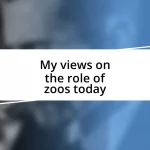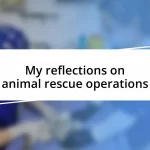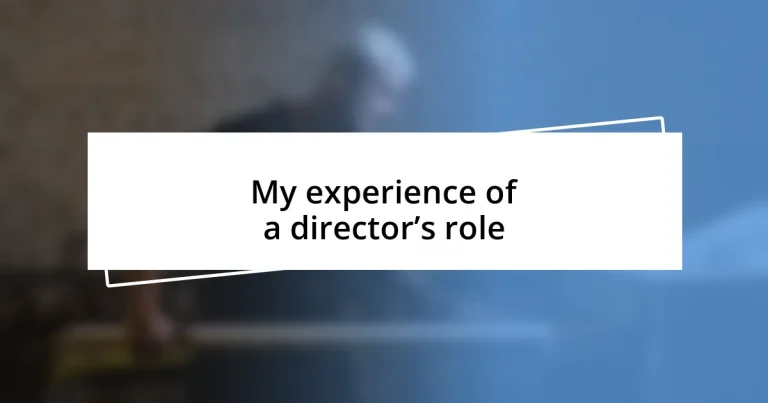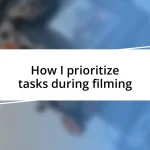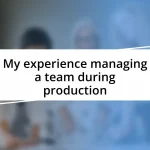Key takeaways:
- Effective communication and alignment of vision among the team can significantly enhance the production process.
- Directors must exhibit adaptability and problem-solving skills to navigate creative and budgetary challenges during filming.
- Building trust through casual interactions and fostering open communication strengthens team dynamics and creativity.
- Personal growth as a director involves overcoming self-doubt, resilience in the face of adversity, and mentoring others to enrich both their talents and your own understanding.
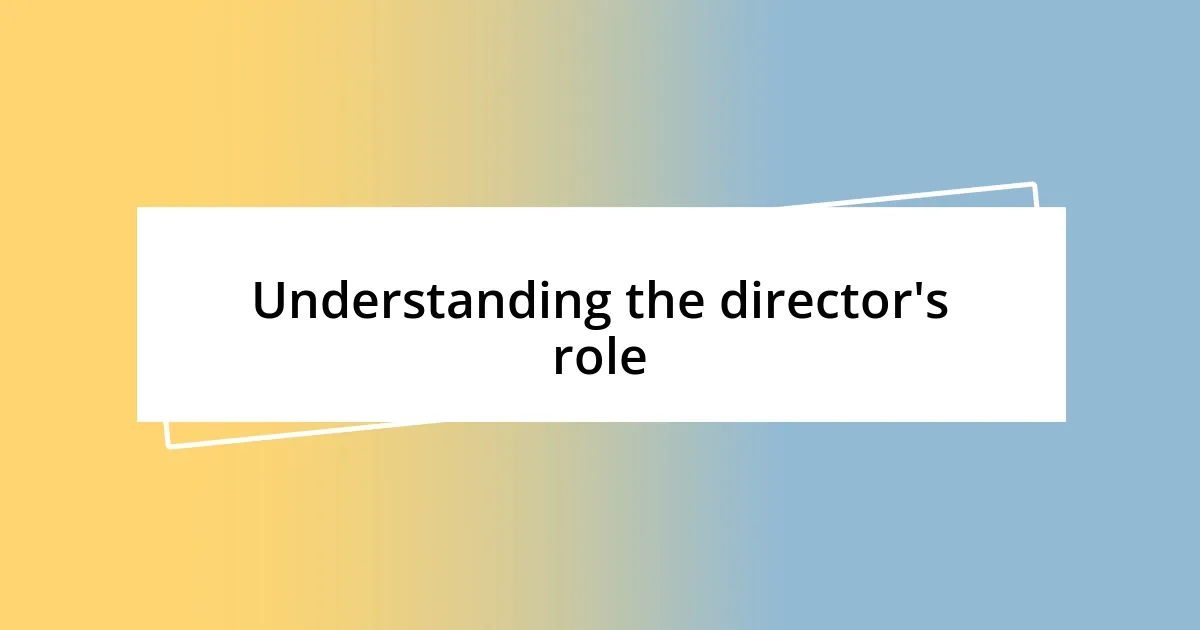
Understanding the director’s role
Understanding the director’s role goes beyond just making creative decisions; it’s about orchestrating every element of a production to bring a vision to life. I remember stepping onto set for the first time, feeling an exhilarating mix of excitement and responsibility. I quickly realized that every choice, from casting to set design, directly affects the story being told.
Communication is another cornerstone of a director’s role. I often find myself asking, “How can I best convey this message?” This question fuels my interactions with the cast and crew, ensuring that each person understands their integral part in the story. When everyone is aligned, it creates a powerful synergy that can elevate the project beyond what I envisioned.
Lastly, time management is crucial. I recall a particular project where we were under tight deadlines, and I had to prioritize decisions on the fly. Balancing artistic integrity with practicality can be challenging, but it taught me that a director must be adaptable and decisive, always maintaining a clear focus on the end goal.
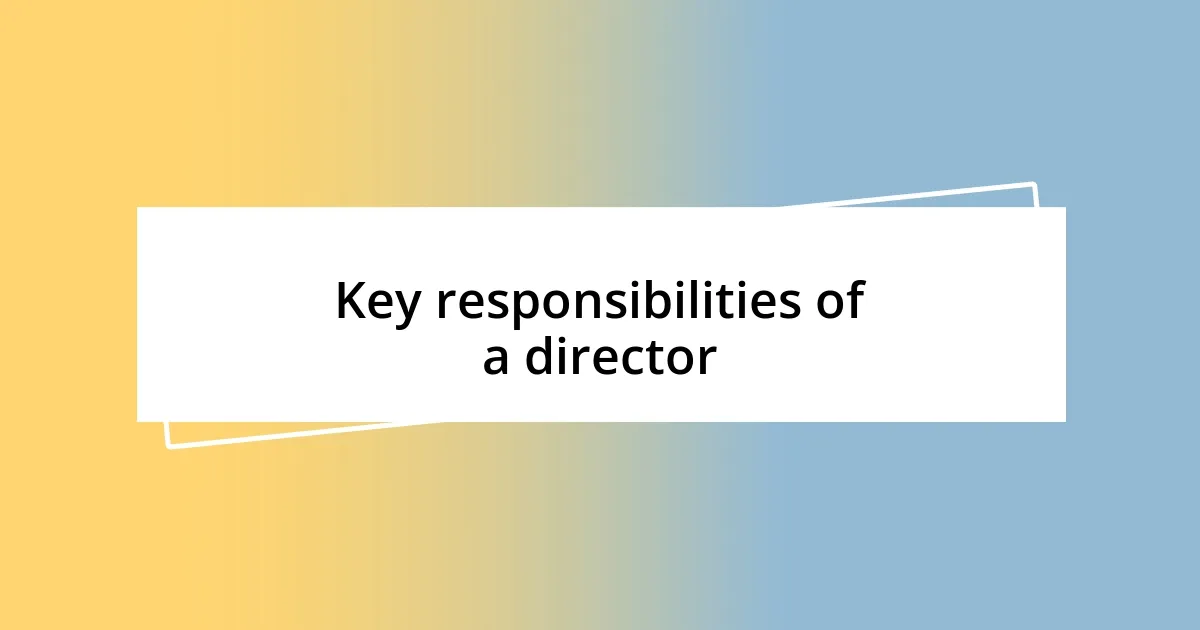
Key responsibilities of a director
One of a director’s primary responsibilities is to ensure a cohesive vision throughout the project. In one of my earlier projects, I vividly remember gathering the entire team to share my concept and inspire everyone. It was a pivotal moment that not only aligned our objectives but also ignited a shared passion for what we were creating. That sense of unity made a significant difference in the overall atmosphere on set, and I learned that when the team is collectively invested in the vision, the outcome often exceeds expectations.
Another key responsibility lies in managing the cast and crew effectively. I often find myself fostering an environment of creativity while maintaining professionalism. During one particularly challenging scene, I noticed a member of my cast was struggling with their lines. Instead of reprimanding them, I took a moment to check in and understand their perspective. This personal touch not only alleviated their stress but also reinforced the trust and respect among us, leading to a stronger performance.
Lastly, directing requires navigating the intricate dynamics of collaboration. I recall a time when I had to mediate differing opinions on set. It wasn’t easy, but I realized that fostering open communication was essential. By encouraging team members to share their ideas and concerns, I helped create an inclusive environment where every voice mattered. This collaborative spirit not only enriched our production but also reminded me of the importance of valuing diverse perspectives.
| Responsibility | Description |
|---|---|
| Vision Alignment | Ensuring the entire team shares a unified understanding of the project’s vision. |
| Cast and Crew Management | Creating a supportive environment that encourages performance and addresses challenges. |
| Collaboration Navigation | Facilitating open communication among team members to harness diverse ideas effectively. |
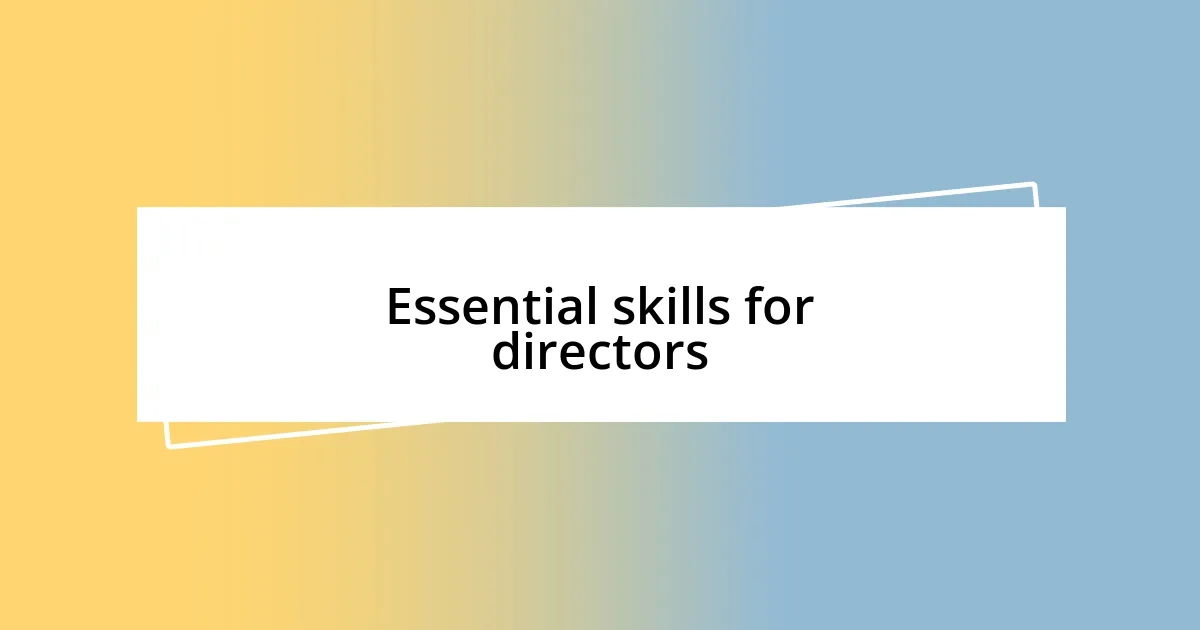
Essential skills for directors
Developing essential skills as a director is key to successful projects. I can’t emphasize enough the importance of adaptability. When I was working on a challenging film, there was a scene that just wasn’t working. Instead of sticking rigidly to the script, I found that shifting the angle and encouraging improvisation led to a more authentic performance. It was a moment of clarity that solidified my belief in the power of flexibility.
Here are some essential skills every director should embrace:
- Communication: The ability to clearly articulate vision and expectations to the cast and crew, fostering an environment of trust.
- Adaptability: Being open to changes and finding solutions quickly, especially when faced with unforeseen challenges.
- Leadership: Inspiring and guiding the team while maintaining a collaborative atmosphere that respects everyone’s input.
- Creative Problem-Solving: Thinking outside the box to overcome obstacles during production while keeping the artistic vision intact.
- Emotional Intelligence: Recognizing the feelings of team members and adjusting your approach to their needs, which can significantly enhance performance.
Each of these skills, gained through experience and practice, contributes to a director’s effectiveness and the project’s overall success.
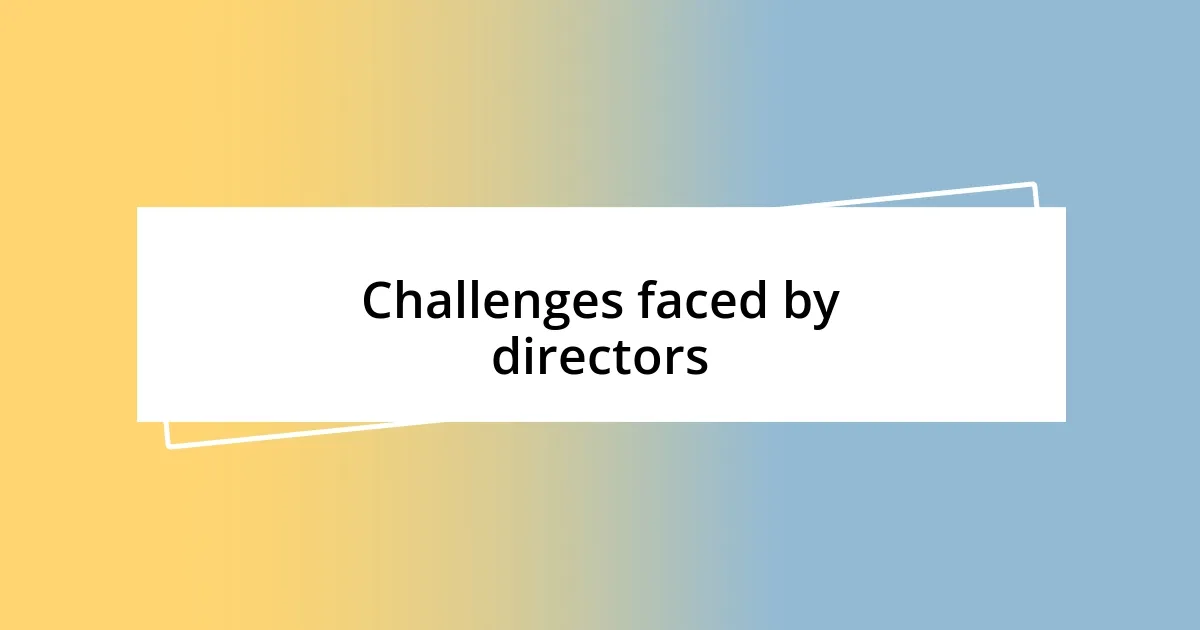
Challenges faced by directors
The pressure directors face can sometimes feel overwhelming, especially when navigating tight deadlines. I remember one project where we were running behind schedule, and I could sense the anxiety building in the team. I knew if I didn’t take a breath and address it openly, the atmosphere would plummet. So, I called everyone together, acknowledged our struggles, and reminded them why we were all there. That moment of honesty transformed the energy on set and reignited our focus.
Another challenge that continuously crops up is the balancing act between creative vision and budget constraints. I recall tackling a visually ambitious sequence that I felt would elevate the film. However, the budget didn’t fully support the elaborate setup I envisioned. It was a real test of my resourcefulness. I had to rally my team, think creatively about alternative approaches, and encourage everyone to brainstorm solutions. Those discussions sparked innovation, and we ultimately produced a scene that captured my original intent without breaking the bank.
Lastly, addressing conflicts among team members can be incredibly taxing. During one shoot, I encountered a significant rift between two key actors that threatened to derail our progress. It was awkward, to say the least. Instead of letting the tension linger, I scheduled a meeting with both of them. It was a vulnerable moment, but we opened up about our feelings. In the end, that conversation not only resolved their issues but deepened their performances, bringing a richness to the final product that I hadn’t anticipated. Have you ever navigated a similar situation? Let me tell you, the reward for facing those conflicts head-on is immeasurable.
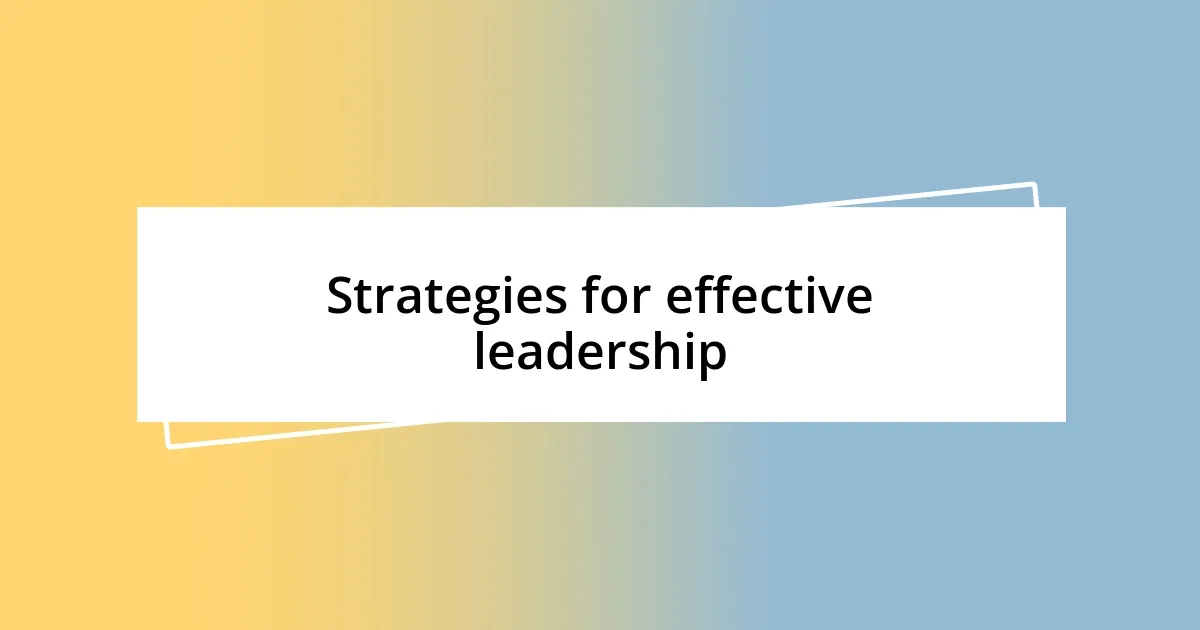
Strategies for effective leadership
When I think about effective leadership, one strategy that stands out is the importance of active listening. During the production of a documentary, I found that some of the best ideas emerged not from me but from the crew members, who had a unique perspective. By genuinely listening to their feedback, I fostered an environment where everyone felt valued. Isn’t it fascinating how a little attentiveness can transform team dynamics?
Another strategy that has served me well is setting clear expectations. I remember a time when I took on a new project with a large cast and crew. Instead of assuming everyone understood the vision, I held a comprehensive meeting to outline our goals and individual responsibilities. This clarity not only reduced confusion but also encouraged accountability. How often do we overlook the basics in the rush of production?
Finally, leading by example is a powerful approach. In one particular instance, I was faced with a day of intense shooting and unexpected technical difficulties. Instead of showing frustration, I remained calm and focused, which inspired my team to maintain their composure. It’s a reminder that our attitudes can greatly influence those around us. Have you ever noticed how leadership is often about embodying the traits you wish to see in others?
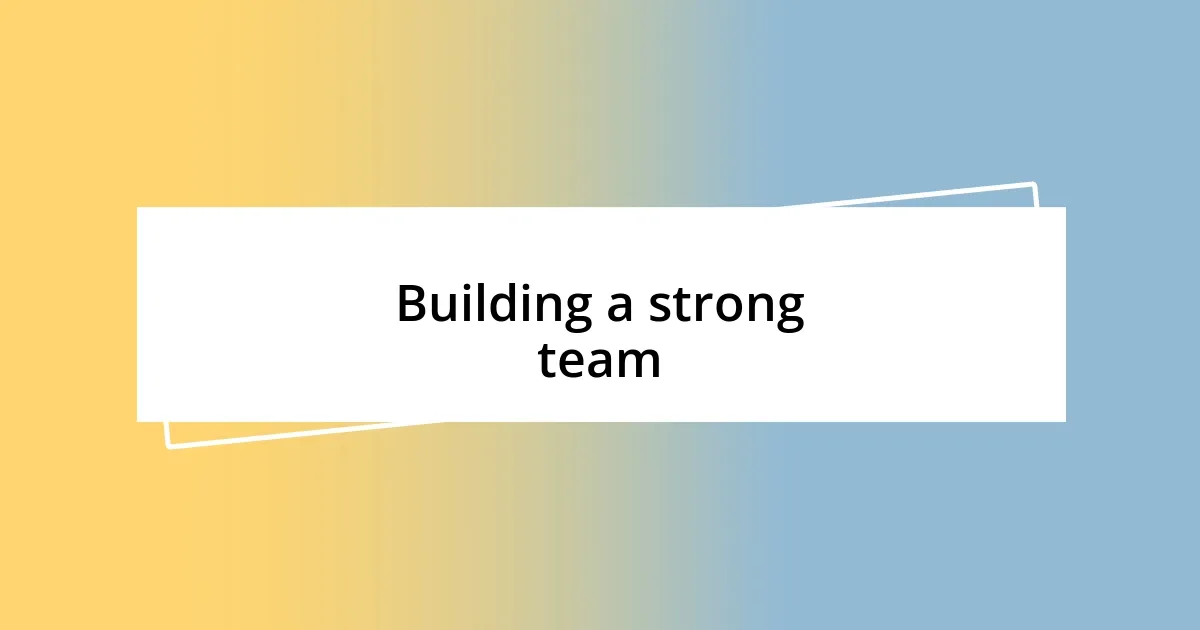
Building a strong team
Building a strong team starts with trust. I learned this crucial lesson during a particularly grueling shoot where the pressure was palpable. One day, I decided to host a casual lunch for the crew. It was a simple gesture, but when I saw everyone laughing and bonding over shared stories, I realized how vital those moments are for building rapport. Have you ever experienced how small acts can create a foundation for strong relationships?
Another key to team building is fostering open communication. In one project, I noticed a talented sound engineer was hesitant to share his suggestions. Rather than letting his ideas simmer in silence, I initiated weekly feedback sessions where everyone could contribute freely. The shift in atmosphere was striking. With everyone’s voices heard, our collaboration flourished, and the creative energy became contagious. Isn’t it incredible how openness can turn a good team into a great one?
Moreover, diversity plays a significant role in strengthening a team. I remember working with individuals from varying backgrounds and skill sets who sometimes approached problems differently. Initially, I found it challenging to balance these creative differences. However, when I began to embrace our unique perspectives, innovation thrived. The solutions we came up with were not only effective but also enriched the entire project. Have you ever thought about how diversity can be a superpower in teamwork? It certainly was for us!
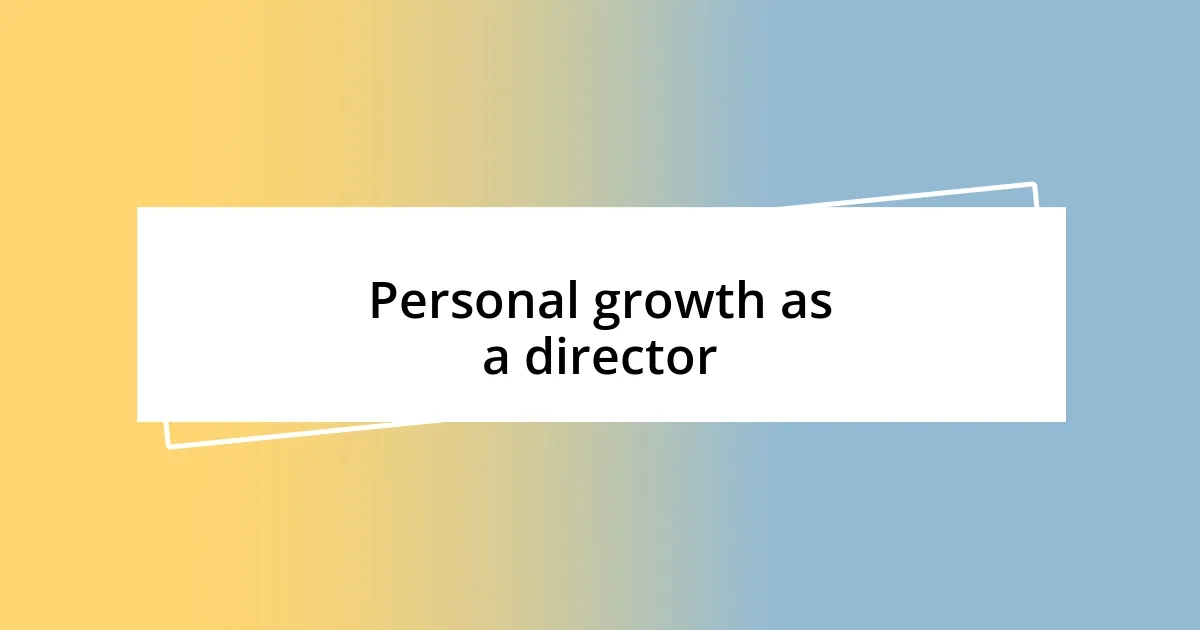
Personal growth as a director
The role of a director has been a profound journey of personal growth for me. I distinctly recall the first time I stood in front of a cast and crew, feeling a mix of excitement and fear. That moment was pivotal; it forced me to confront my self-doubt and transform it into confidence. Have you ever faced a daunting situation that pushed you to grow? For me, owning that space was the first step in my evolution as a leader.
As my experience deepened, I learned the importance of resilience. There was a challenging shoot where everything seemed to go wrong—the weather, the equipment, and even my script. Instead of crumbling under pressure, I discovered that my ability to adapt in the moment not only saved the day but also taught me about my own strength. It’s astonishing how adversity can become a powerful teacher, isn’t it?
One of the richest aspects of this role has been the opportunity to mentor emerging talents. I remember guiding a young actress who was struggling with her character. Through our discussions, I realized that my insight was not only beneficial to her but also enriched my understanding of storytelling. Watching her grow felt like reflecting a piece of myself back at me. Have you ever found that teaching someone else can deepen your own knowledge? That exchange has been one of the most rewarding facets of my journey.






